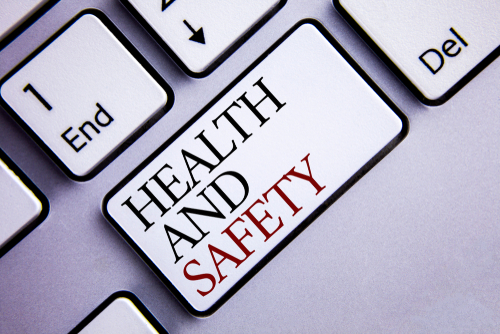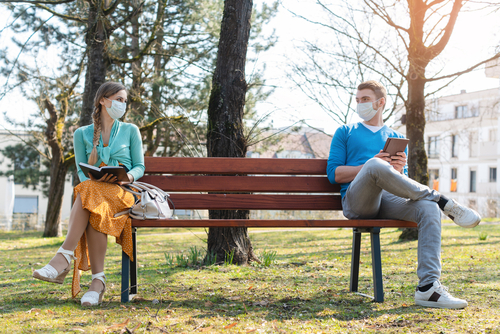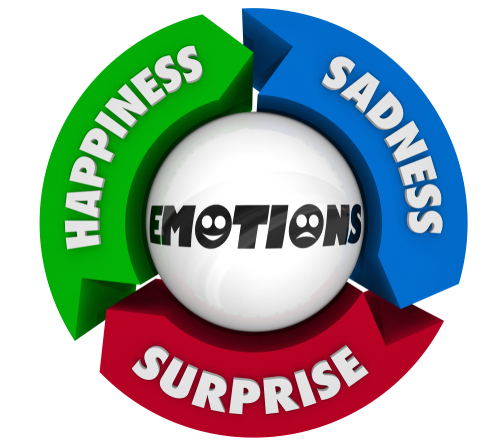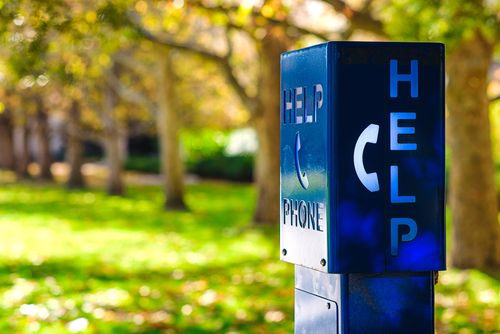Incoming collegiate students from around the country are thinking more about their health and safety than ever before. With the threat of Covid-19, in 2020, and the possibility of other illnesses or epidemics, students and parents may need to re-visit and reconsider the advice of past generations as well as modern science and the latest information. These tips for keeping good health in the college and university environment will assist students in keeping their immune systems as well as their grades in the best possible shape.
Physical and Mental Health are Interconnected

Physical and Mental Health have been shown more and more by scientific studies to be interconnected. According to the World Health Organization, health is defined as “a state of complete physical, mental and social well-being and not merely the absence of disease or infirmity.” The WHO also states that “there is no health without mental health.”
College students, from beginners to grad school students, are under the constant demands and pressures of completing coursework assignments, maintaining good grades as well as forging new relationships and being in new environments should focus on maintaining physical as well as mental health. Many students entering college are away from their parents’ home for the first time. This may mean students are, for the first time, solely responsible for their own health, both mental and physical.
Being in a new environment away from home can cause stress, anxiety and neglect of proper diet and exercise, all of which will negatively affect a student’s health. Thankfully, young students often have naturally active immune systems, and mental resilience as well as energy to combat these threats to their health. Older students will naturally have some of the stresses that come with maturity such as family, work and balancing complex schedules. These tips for maintaining both mental and physical health will assist students of all ages.
We’ve built this convenient “Jump To A Heading” section JUST for you!
PHYSICAL HEALTH
In many ways, addressing physical health can be easier than attempting to maintain mental health. However, because physical health has a direct impact on mental health, taking good care of one’s body is a great place to start for sustaining over-all health. Eating a good diet is one of the first and most important ways to stay physically healthy.
EATING A HEALTHY DIET

“When diet is wrong, medicine is of no use. When diet is correct, medicine is of no need.” – Ayurvedic Proverb
Eating healthy food on a college campus is easier than it has been in the past but still remains a challenge. Dining hall chefs who are cooking to accommodate thousands of ravenous young people is a little different than the home kitchen. However, more dorms contain kitchens than before and many students live off-campus. Cooking for oneself will often bring its own challenges amid time constraints, however, it grants students the ability to make their own food choices.
- Avoid Peer Pressure – According to WebMD, peer pressure may affect what we eat. Research shows that eating like the people around us may be a way of strengthening our identity within a social group. The lead investigator of a research project, Eric Robinson, from the University of Liverpool, has found that this influence is present even when people are eating alone. He says, “Human behavior can be guided by a perceived group norm, even when people have little or no motivation to please other people.” Intentionally making one’s food choices based on what is healthy and not on what friends are eating is an important start to eating well. And, who knows…one may even start a trend.
- Be Creative! – This tip is especially necessary for those students eating regularly in a school cafeteria. Combining foods from different areas of a cafeteria can be a great way to change up one’s diet. Grabbing fruits and vegetables from the salad bar to add to wraps, pizza, soup or sandwiches keeps students’ diets well rounded. Some variety in diet is necessary for maintaining good health in order to ensure that the body is getting all necessary vitamins and nutrients.
- Every Sip Counts – What we drink has a big effect on our health. Because drinking is a lot easier than eating, sipping a soft drink or fifth latte while we work or study can happen without much conscious thought. The drinks we sip all day, however, still contain nutrients and calories….or not.
- More Water! – Water covers 71% of the earth’s surface and an adult human body consists of 60% water. We don’t just absorb water from the atmosphere, we have to drink it as well. Most people have to make a conscious effort to drink enough water. Habit plays a huge role too, in how much we drink. So the more one drinks a sufficient amount of water, the more likely they are to keep doing so. Drinking water also lessens cravings for unhealthy, sugary drinks which not only pile on unwanted calories but actually deplete our bodies of nutrients. According to mayoclinic.org, men require 15.5 cups of fluids a day and women require a daily 11.5 cups of fluids. And, unlike camels, humans can’t exactly store water long term. So, fill that water bottle and keep tanking up throughout classes and study time.
- Less Coffee? – The fuel of undergraduates and graduate students alike, coffee was consumed by 92% of students in 2019. The main reason students drink coffee is to stay awake. Other reasons given include liking the taste, social aspects of consumption, and improvement of concentration. Only 9% of students say that coffee helps them with stress, which confirms the research of James D. Lane, professor of medical psychology at Duke University Medical Center. According to Dr. Lane, “Caffeine exaggerates the stress response.” He goes on to say that, “At the cellular level, caffeine blocks the receptor normally used by adenosine, a brain modulator that provides feedback to avoid overstimulation of nerve cells. If adenosine is locked up, nothing keeps the nervous system from getting too excited at a cellular level.” However, dieticians and researchers alike say that coffee is effective in boosting concentration and memory as well as alertness. To stay healthy, college students should consume less than 3 cups of coffee a day. They should also try to get enough sleep rather than relying on coffee to keep them awake.
- Alcohol – It goes without saying that drinking too much alcohol can be detrimental to your health. Consuming too much alcohol can damage your organs, thin your bones, affect coordination, and lead to alcohol dependence. And hangovers never help students to pass tests. Drinking a moderate amount may help to relieve students from the pressures of school, keep them relaxed in new social environments, and can still be part of a healthy lifestyle.
- Eat Lots of Fruits and Vegetables – Eating a variety of fruits and vegetables is one of the best ways to keep your diet healthy. Mango, pineapple, and grapefruit are excellent sources of Vitamin C as well as other essential vitamins and antioxidants. Apples and bananas are also nutritionally packed and are less expensive than other fruits. One cup of spinach will give students their full daily dose of Vitamin K and half their Vitamin A while a cup of raw kale will fulfill their daily requirement for vitamins A, C, and K and includes B vitamins, calcium, potassium, and copper.
- Stock Healthy Snacks – Students who keep junk food in their dorm or backpack will only be tempted to eat it. However, making some rules will sweep those temptations away. Exclusively buying health bars, granola, nuts, dried fruit, or popcorn bags and staying away from the less healthy snacks of roommates or classmates will fortify the immune system and give students more energy throughout the day.
- Don’t Cram – Though studying for class and tests last minute may seem an inevitable part of attending college, it doesn’t necessarily have to be, at least not for the most part. Scheduling time carefully and avoiding distractions are ways to avoid cramming for tests. Staying up late with extra stress is hard on one’s health in any case, but it is also a temptation to snack and eat junk food late at night.
- Buy Snacks and Groceries Regularly – Inconvenience is often what drives students to reach for unhealthy food. By regularly keeping healthy food within reach, getting hungry won’t become a temptation to grab convenient junk food.
- Eat Regularly – Eating at least three meals a day, or 4-5 smaller meals a day keeps the energy flowing regularly and works as insurance against bingeing. On the other hand, turning to food to reduce or relieve stress is not a healthy habit. Finding ways to relieve stress as well as keeping healthy snacks on hand will help students to eat consistently.
- Control Portions – There are contrary opinions on whether counting calories or not is helpful to healthy eating. However, everyone seems to agree that controlling portions of food is good practice. Counting calories is only one of many ways to control portions. Whether it’s using a smaller plate, measuring or weighing food (a hard thing to do in a cafeteria!), or keeping track with an app, learning to control portions is a great way to eat nutritiously.
- Take Vitamins – Getting all necessary nutrition from healthy food may be ideal, but is often impractical and very difficult. Taking whole food or other vitamins on a regular basis will fill in the nutritional gaps that will keep students running on all cylinders. According to WebMD, “even the most conscientious eaters may have dietary deficiencies.” The website goes on to list seven important nutrients that most Americans aren’t getting enough of. These seven vitamins are Calcium, Potassium, Fiber, Magnesium, Vitamin A, Vitamin C, and Vitamin E.
- 80/20 – Indulge sometimes – Letting down sometimes means a more relaxed, enjoyable approach to life. This kind of mentality understands that what we eat affects how we feel. However, success is often found by eating strictly at least 80% of the time and relaxing a bit for the other 20%. Eating out with friends, enjoying the occasional dessert, and maybe even having a midnight snack once a week are ways to relieve stress which is an important part of staying healthy.
STAYING FIT!

Regular exercise can lift your mood, help you lose weight, improve memory, increase energy levels, and reduce the risk of disease. With all of these benefits, what is there to lose? Some college students may be wary of exercise because they have the impression that exercise will take too much time away from other areas of their life like work and study. The Physical Activity Guidelines for Americans recommend that adults get 75 minutes of vigorous-intensity physical activity or 150 minutes of moderate-intensity aerobic physical activity each week. This means that in order to be healthy, students only need to walk or bike 20-30 minutes a day. Of course, jumping into a weight lifting or aerobics class is a great idea too. But just walking from class to class every day can often give students the exercise they need. Here are a few tips for getting exercise on campus.
- Ride or Walk – Instead of taking a bus or public transportation, start biking or walking to class. The extra effort will keep you sharper during class and may even be all the exercise you really need! If you are a commuting student, start parking at the far end of the parking lot. There are often more parking spots so you may save time in the long run as well as get your exercise.
- Room Exercise – Exercise with a video – there are many available for all different levels of fitness. From Yoga to high-powered workouts, exercising in your room is a great way to get in shape without having to go to the gym or the pool. Other ways to exercise in your room are with only bodyweight exercises. These include squats, pushups, and other exercises that only require your body to create resistance and muscle tone. Don’t forget to stretch!
- Take the Stairs! – Instead of opting for the elevator every time, head for the stairs. Often, taking the stairs is just as fast anyway, since students can avoid waiting for the elevator.
- Start Small – Beginning an exercise program with too high of an expectation can lead to discouragement and eventually cause students to give up. Start with 10-15 minute exercise workouts. If you usually work out longer, don’t give up on busy days, just opt for a shorter routine to keep you in the habit.
- Exercise with a Friend! – Nothing is more fun than talking while you jog (if you can!) or walk. Taking a physical education class with a friend can make the whole experience worth it. A friend can even be a book. Try reading while on an exercise bike or treadmill. Ambitious students may even study while they workout.
- Take a PE Class – Taking a physical education class for credit is also incredibly efficient! Boosting your grade point average while staying in shape is a win-win!
- Try an Intramural Sport! – Just because you’ve never played a sport before doesn’t mean you can’t. Intramural sports are a fun place to jump in and try new things. You may discover you had a hidden talent that you never used! Low-pressure competition can make playing an intramural sport one of the best ways to get exercise as a college student.
IMMUNITY

Although Benjamin Franklin’s famous quote, “An ounce of prevention is worth a pound of cure,” was initially directed toward firefighting, it has often been used in the realm of health. A healthy immune system has proved this quote right more often than not. The immune system is the network of cells tissues and organs that help the body to fight invaders. There are numerous aspects to the immune system that we may not often think about but are essential to keeping us healthy.
Lines of Defense
- Be Kind to your Skin – Not only does our skin protect us from temperature changes and serve as a waterproof barrier, it is also one of our main lines of defense against disease. Our body’s largest organ, the skin is home to billions of cells, far more in fact, than are in the blood. The skin also is the habitat of thousands of bacterial and fungal species which are essential to the health of our skin and bodies. According to a 2015 Harvard PhD Student, Rachel Cotton, “How our skin orchestrates this dialogue with microorganisms and physical insult is integral to its function, and to our health.” Keeping our skin healthy involves many of the same good habits that keep the rest of our body healthy.
- Keep Drinking Water – Although this has already been mentioned, drinking water is one of the best ways to nourish and hydrate your skin. The skin contains 64% water and needs to be replenished.
- Use Skin Moisturizers – Using a lotion or skin moisturizer immediately after showering or bathing will allow the pores to absorb more readily. Also, applying hand lotion or cream after washing hands will help them to retain their much-needed moisture. Lip balm or chapstick will keep lips moist as well. Moisturizers that contain vitamins and are oil-free are the most healthy for the skin.
- Clean Smart – Avoiding long exposure to hot water will keep skin healthier. Shorter showers with lower temperatures have positive effects on skin moisture. Also, using mild soaps and detergents while cleaning your body and clothes will prevent skin reactions.
- Wear Sunscreen – When outdoors, sunscreen will prevent the skin from being damaged by sunburn and UV rays.
- Be Kind to your Gut – The body has so many lines of defense that only a biology class could cover most of them. However, other than our skin, hair, and other outer defenses, many others are related to our gut. These include enzymes, stomach acid, and the good bacteria that not only help digest our food but keep the bad bacteria in check. According to HealthLine, “numerous studies in the past two decades have demonstrated links between gut health and the immune system, mood, mental health, autoimmune diseases, endocrine disorders, skin conditions, and cancer.” Each person has between 300 and 500 different species of bacteria in their gut which make up the microbiome of their gut. Listed here are some tips for creating and keeping a healthy “gut microbiome.”
- Watch your Diet – Diet affects almost everything about our bodies, hence the saying, “You are what you eat.” According to HealthLine, some of the best foods to eat for gut health are:
- High Fiber Foods – Beans, oats, peas, and bananas along with berries and asparagus are some high fiber foods that have shown to have a positive effect on our gut.
- Fermented Foods – These include foods such as sauerkraut, miso, yogurt, and kefir. Fermented foods contain large amounts of probiotics or good bacteria that can replenish our gut.
- Foods Rich in Collagen – Collagen, the tissue building component, also contains amino acids that fuel the stomach and intestinal tract. Fish, chicken, bone broth, berries, and egg whites all contain collagen.
- Prebiotic and Probiotic Foods and Supplements – Probiotics are live yeasts and bacteria that can replenish the bacteria in your gut which are necessary for digesting food and keeping the gut healthy. Prebiotics are food for probiotics. Taking both of these supplements will keep more healthy bacteria in your gut as well as make those bacteria prosper.
- Watch your Diet – Diet affects almost everything about our bodies, hence the saying, “You are what you eat.” According to HealthLine, some of the best foods to eat for gut health are:
- Get Enough Sleep – Although it’s almost as tough as getting good grades for college students, getting enough sleep will do wonders for the immune system. According to mayoclinic, the immune system releases proteins called cytokines during sleep. These cytokines are needed in higher quantities with infection or inflammation or when a person is under stress. Not getting enough sleep will prevent the body from accumulating these cytokines which are an aid to immunity. Although getting enough sleep in school isn’t always a viable option, it should be the norm in order to stay healthy. Here are a few tips to keep students from nodding off in class from short nights.
- Keep the Same Schedule – Keeping a general schedule will help your body to know what to expect. Trying to hit the sack at the same time every night and get up around the same time every day will teach your body optimal sleeping times. Also, keeping a schedule will make cramming less necessary which means fewer late nights.
- Limit Caffeine – Drinking coffee or other caffeinated beverages in the evening will prevent students from getting good rest. Set a time after which no caffeine is allowed. A good time to stop drinking caffeinated beverages is five to seven hours before going to sleep.
- Keep it Dark – Keeping it dark doesn’t mean reading horror stories before bed which may actually prevent good sleep. It means making sure that all the lights are out. This may mean communicating with roommates to find the best time for everyone to turn the lights out. Keeping it dark helps the body know it is time to rest.
PREVENTING ILLNESS

With the experience of living in a pandemic under their belt, most students have been well versed in how to best prevent illness. Thankfully long-term or fatal diseases are quite rare on college campuses. However, the close proximity of many students makes colds, cases of flu, and contagious illness a common occurrence and no small disruption to college life. Here are some tips, besides eating healthy, staying fit, and keeping that immune system in tip-top shape to avoiding illness on campus.
- Drink Water – Was this already mentioned? Drink some more! Nothing flushes toxins like water and the last thing anyone needs during illness is dehydration. Drinking enough water is especially important in hot climates or as students increase exercise routines.
- Wash your Hands – Anyone who has gone anywhere during the Covid-19 pandemic has seen plenty of instructions on how, when and how often to wash their hands. They also should know not to touch their eyes, nose, or mouth. Frequent hand washing prevents germs and viruses from spreading across campus.
- Stay Home – Students who are feeling under the weather should stay out of classrooms in order to prevent the spread of viruses and infectious diseases. Staying at home to rest is the best way to recover quickly and professors will understand!
- Don’t Get too Close – While it’s perfectly appropriate and definitely a kindness to help sick fellow students, bringing them soup, hydrating drinks and books doesn’t mean getting close to them. They should understand. Avoid sharing drinks or silverware with healthy friends as well.
- Know When to see the Doctor – Students have very busy schedules and may be tempted to think that illness will improve on its own. If the illness persists or if they need medical advice, they should not hesitate to skip class to go and see a doctor. Antibiotics or other medication along with other types of medical intervention may be a necessary part of recovery.
STAYING SAFE ON CAMPUS…and OFF!

Staying safe is the most important aspect of college life. A statistic shows that the number one cause of fatality among college students is accidents. The main common factor among these tragic accidents is alcohol. According to one study, over the course of two years, 500,000 college students were injured accidentally because of drinking, and a shocking 600,000 students were either hit or assaulted by a fellow student under the influence of alcohol. Studies have also shown that college students consume more alcohol, engage in binge drinking (4 consecutive drinks for females and 5 for males), and are impaired by alcohol consumption on a regular basis than their non-student peers. Again, avoiding peer pressure and being aware of the drastic mind-altering effects of drinking will go a long way to preventing these unnecessary accidents. Other accidents include non-alcohol related car accidents, pedestrian accidents, and sports injury. Staying safe on campus also involves a way to protect against intentional assault.
- Drink Safely – Students’ approach to alcohol could drastically improve the number of injuries on any campus, saving numerous lives and preventing situations that could cause guilt and regret. “Binge drinking” or drinking excessive amounts of alcohol in one sitting is one of the most dangerous forms of drinking since it most drastically impairs the ability to make decisions and can lead to alcohol dependency or death.
- Be Aware – Probably the most important principle to remember when drinking is to stay alert and know what is happening. Although some drinkers may intentionally consume too much alcohol, most simply don’t know or remember their own limit or how much alcohol they are consuming. Each person is different, so based on experience, keep the amount of alcohol under the limit of what you can tolerate. This also entails knowing the alcohol content of what you are drinking along with the serving size as well as not accepting a drink from a stranger or leaving your drink unattended.
- Choose Safe Friends – Spending time with people who don’t normally drink alcohol, as well as attending and developing interests in non-alcoholic events will shape a college student’s “drinking culture.” If friends don’t see the importance of choosing a designated driver or not engaging in drinking-games, they may be destructive friendships. Although moving away from certain friendships is difficult, it may be safer in the long run.
- Develop Drinking Tactics – There are many “tactics” that can be employed in drinking environments. These include sipping a drink slowly, not accepting a drink if it’s not desired, holding a non-alcoholic beverage, eating protein while drinking, developing some witty lines for saying “no,” choosing certain days to avoid alcohol, not drinking before a party, and many others. Developing one’s own “drinking strategy” can create long-term habits that will prevent unexpected accidents and poor decision making in the moment.
- Drive Safely – It doesn’t need to be repeated that no level of alcohol consumption is safe when driving. However, even without alcohol, car accidents happen. Distractions inside and outside of the car can cause momentary distractions that can cause injury and death. Some tips for driving safely include:
- Know the Rules – Although students have passed a driving test, they may need to refresh their knowledge of the general rules of driving. Some states may have different rules, so if students are attending college out of state they will need to gain the necessary knowledge to drive safely.
- Turn Off the Phone! – This may be one of the most important tips on the list. According to USA Today, 25% of car accidents are caused by cell phone usage. These are needless accidents that can be prevented by turning off the phone and/or leaving it in the back seat.
- Make Passenger Rules – It’s tough to be the one setting rules for friends, but the reward will be knowing that they and you are safe. Insist that passengers not distract you, the driver, with their phones or conversation. Don’t allow wild behavior, jostling, or distracting use of the radio in the car. After all, it is the driver who will be responsible for any accidents, not the passengers.
- Watch out for Pedestrians – There are many pedestrians on any college campus and a significant amount of pedestrian injury. Driving slowly, making sure that passengers get in and out of the car quickly, and being aware of one’s surroundings will limit these pedestrian-related accidents.
- Lock Your Doors – Keep the doors to dorm rooms and cars locked in order to avoid burglary and break-ins. Most thefts on campus can be avoided by making them more difficult for the perpetrator. Valuables should be stashed out of sight as well.
- Safety in Numbers – Staying with trust-worthy people as well as walking with a friend in less populated areas will go far to preventing assault or theft.
- Be Aware of Surroundings – Check rooms for emergency exits as you enter them. Also, watch out for suspicious behavior when with a group. Other awareness items include looking out for erratic drivers, icy conditions, and storms which can prevent pedestrian injuries and falls as well.
- Charge your Cell – Students should keep their cell phones charged in case of emergencies. They should also sign up for campus alerts and be willing to call campus wellness staff or campus security if needed. College campuses also place security phones around campus which can be used in case of an emergency.
- Attend a Class or Program – College safety classes are often offered on college campuses in person and online. Personal safety classes usually contain information and training on recognizing threats, taking precautions, and personal safety skills. Geared toward how to protect oneself on busy college campuses, college safety classes also teach self-defense, how and when to use pepper spray and personal alarms as well as how to minimize the possibility of sexual assault.
MENTAL HEALTH
Mental Health is mentioned last here, but is certainly not the least of students’ concerns. Rather, mental health, as was stated before, is essentially interconnected to physical health and vice versa. Not only that, but presumably in an academic environment such as college, the ability to think well, remember what one has learned as well as stay alert and positive will have an immediate effect on one’s coursework and future. Because of the various strains on mental health in the college environment, depression is more common than it ought to be and suicide rates are shockingly high.
Named as the second most likely cause of fatality on campus, suicide is a real problem and ought to be taken very seriously. Thankfully many have survived depression and have gone on to offer aid and support as well as some of the tips below to assist students in navigating that state of mind. All of the tips mentioned on this list, such as eating well, exercising, and getting enough sleep have been known to help with depression, making a strong case, again, for the link between mental and physical health. The tips below are other ways to specifically cope.
STAY CONNECTED TO FRIENDS AND FAMILY

- Stay Connected – Creating a network of friends may be difficult for some personalities. Also, there are some who may be in some way estranged from their family or without any family that they can trust or be close to. In spite of these difficulties, it is of utmost importance for students to create a network of at least acquaintances that they know and trust.
- Family – Undergraduates who are away from home for the first time may feel either elated to be away from the pressures of family or simply too overwhelmed with their classes and new life to stay in touch. However, family relationships have been built since birth and are some of the strongest ties that students can claim. If students are lucky enough to have good family relationships, they should maintain these even from a distance. Don’t forget to call Mom, Dad, or siblings as you venture out into the collegiate world. Remember, they know you much better than the friend you made 2 months ago.
- Friends – Friends are people that you may have met recently or known for a long time, perhaps from childhood. The benefit of having good friends or even more surface friends in college is that they can physically spend time with you. Keeping up long-term, long-distance relationships, perhaps from high-school, can help stave off the depression from being in a new place. So can making new friendships and spending time with people who you have something in common with. Almost any friend or acquaintance would drop everything to help someone who is struggling with depression or anxiety just as you would for them, so don’t be afraid to call and tell someone how you are feeling.
UNDERSTAND THE CYCLES OF DEPRESSION

- Understand Cycles – One of the phenomena about human beings is that the present always feels like an eternity. Though we know the morning will come within a few short hours, the night can feel like it goes on forever. It is quite normal for people to go through periods of sadness that can last as long as two weeks. However, if these feelings last longer than two weeks, they may be signs of something deeper. Telling yourself, when depressed, that the situation will change may be a truth that helps one survive and make the right choices in the moment. Distinguishing between feelings and reality is another way to approach cycles of life. Certain realities will always be with us, and students may need counseling in order to address and cope with these issues long term. Other depression may have unpredictable causes.
KNOW THE SYMPTOMS OF DEPRESSION

- Know Symptoms – Being able to identify not only the causes of depression but also the symptoms will allow students struggling with depression to use the right methods of self-help. Here are some of the common types of depression – their symptoms and a few general accompanying coping tips.
- Major Depressive Disorder – Major Depressive Disorder is experienced by many adults as well as college students. It is a condition that can last from weeks to months and be a one time or recurring experience. Symptoms include despondency, loss of appetite, lack of energy, feelings of worthlessness, and thoughts of suicide.
- Change daily habits to positive rather than negative ones
- Receive psychotherapy – a therapist will help those struggling with Major Depressive Disorder to work through any crisis in their life as well as many other aspects of their depression.
- Manage with medication – mood-boosting or anti-depressant medication may be the best way to cope with depression
- Bipolar Disorder – Bipolar Disorder or Manic Depression is most identifiable by its alternating pattern of extreme happiness with severe dejection. Depressive stages are similar to major depression. However, periods of seven days may be experienced in which a student may have more energy, difficulty sleeping, increased self-esteem, and euphoria. A student who thinks they may have bipolar disorder should see a doctor in order to rule out other conditions such as hypothyroidism which could create some of the same symptoms. A doctor will refer them to a specialist in order to be tested for bipolar disorder.
- Depressive Psychosis – Depressive Psychosis sometimes accompanies depression. Students may have delusions, have paranoia, and believe and feel things where are not true. These hallucinations are often associated with some kind of perceived guilt. Ways to cope with depressive psychosis are similar to how to handle major depressive disorder.
- Manage with prescribed anti-depressant drugs
- Receive electro-convulsive therapy
- Seasonal Depression – Seasonal Depression or Seasonal Affective Disorder is when people experience depression most often during the winter months as the days start to get shorter. Symptoms include feeling hopeless and sad as well as an increased need for sleep and withdrawal from social interaction. Ways to cope with seasonal depression include:
- Counseling and therapy
- Light therapy
- Dawn simulator
- Regular sleep
- Medication
- Situational Depression – Situational Depression is brought on by a specific event such as a broken relationship, death of a family member, or another traumatic event. Symptoms of situational depression are similar to major depression but may also include frequent crying and an inability to concentrate. This type of depression is usually relatively short-term but can be very disruptive to college life.
- Improving healthy habits
- Strengthening one’s support system
- Cognitive-behavioral therapy
- Major Depressive Disorder – Major Depressive Disorder is experienced by many adults as well as college students. It is a condition that can last from weeks to months and be a one time or recurring experience. Symptoms include despondency, loss of appetite, lack of energy, feelings of worthlessness, and thoughts of suicide.
SLOW DOWN, RELAX and DE-STRESS!

- De-Stress – According to HealthLine, “emotional stress can play a role in causing depression or be a symptom of it.” Stressful situations are no fun for anyone, let alone those who are already struggling with depression. Poor lifestyle choices can cause stress and can gradually be eliminated by forging new and healthy habits. Using technology too much has been linked to an increase in stress as has working too much. Here are a few more tips for relieving stress especially when stress is causing any form of depression or suicidal thought.
- Take periodic breaks from work – Don’t become a “work-a-holic.” Set schedules and stick by them as much as possible and take time off to relax with friends.
- Find an enjoyable hobby – For college students, this may include reading something other than school assigned readings, hiking, painting, or yoga.
- Learn effective breathing exercises – Meditation and/or yoga as well as prayer may also help those struggling with depression and suicidal thoughts.
- Lower standards of expectation – Rather than trying to keep up with fellow students, just do the best that you can do and then relax.
- Get out of stressful situations – Some stressful situations, such as attending class and everyday activities will have to be coped with, however, certain toxic friendships or abusive relationships should be ended. Students can find a friend to support them through these difficult transitions.
BUILD ON YOUR SUCCESS!

- Build On Success/Make a List – Gaining victory over depression may feel like an uphill battle. Remembering that feelings of hopelessness are a normal part of depression and don’t accurately reflect one’s achievements may help. Taking baby steps toward creating healthy habits, building social networks, or staying in touch with family will prevent students from slipping further into depressive states. These small steps are really big steps toward recovery. Students struggling with depression should make lists of small steps or even one small step to be accomplished daily and build slowly toward their goals.
NO SHAME IN GETTING HELP

- Know When to Get Help – There are times when people struggling with depression will feel suicidal. This truth is represented by the number of students each year who do, in fact, take their own life. Many students who have regained their sense of worth and value after depression have been witness to the darkness of these moments. Often these brave individuals will go on to start support groups or become counselors and therapists. They are sympathetic and have given their lives to helping others who are going through what they experienced. If students ever have suicidal thoughts they should reach out to those who are there to help them.